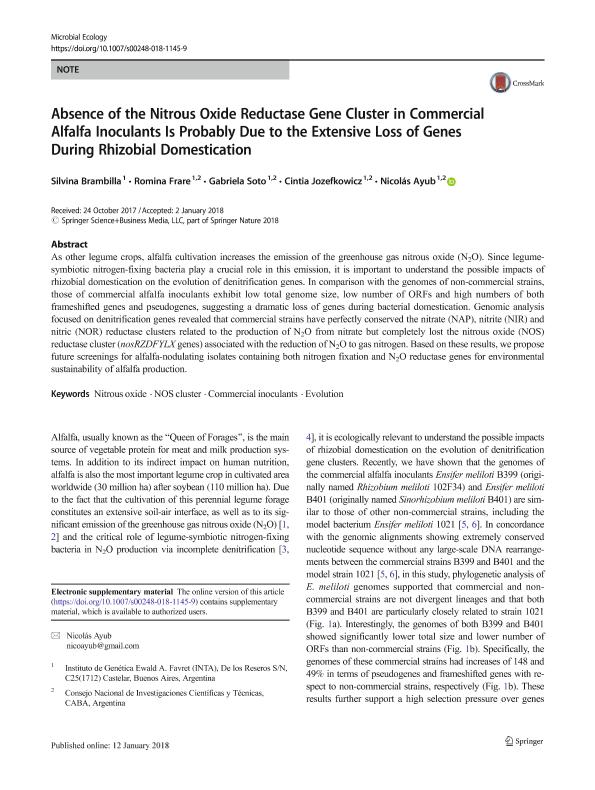Artículo
Absence of the Nitrous Oxide Reductase Gene Cluster in Commercial Alfalfa Inoculants Is Probably Due to the Extensive Loss of Genes During Rhizobial Domestication
Brambilla, Silvina Maricel ; Frare, Romina Alejandra
; Frare, Romina Alejandra ; Soto, Gabriela Cynthia
; Soto, Gabriela Cynthia ; Jozefkowicz, Cintia
; Jozefkowicz, Cintia ; Ayub, Nicolás Daniel
; Ayub, Nicolás Daniel
 ; Frare, Romina Alejandra
; Frare, Romina Alejandra ; Soto, Gabriela Cynthia
; Soto, Gabriela Cynthia ; Jozefkowicz, Cintia
; Jozefkowicz, Cintia ; Ayub, Nicolás Daniel
; Ayub, Nicolás Daniel
Fecha de publicación:
01/2018
Editorial:
Springer
Revista:
Microbial Ecology
ISSN:
0095-3628
Idioma:
Inglés
Tipo de recurso:
Artículo publicado
Clasificación temática:
Resumen
As other legume crops, alfalfa cultivation increases the emission of the greenhouse gas nitrous oxide (N2O). Since legume-symbiotic nitrogen-fixing bacteria play a crucial role in this emission, it is important to understand the possible impacts of rhizobial domestication on the evolution of denitrification genes. In comparison with the genomes of non-commercial strains, those of commercial alfalfa inoculants exhibit low total genome size, low number of ORFs and high numbers of both frameshifted genes and pseudogenes, suggesting a dramatic loss of genes during bacterial domestication. Genomic analysis focused on denitrification genes revealed that commercial strains have perfectly conserved the nitrate (NAP), nitrite (NIR) and nitric (NOR) reductase clusters related to the production of N2O from nitrate but completely lost the nitrous oxide (NOS) reductase cluster (nosRZDFYLX genes) associated with the reduction of N2O to gas nitrogen. Based on these results, we propose future screenings for alfalfa-nodulating isolates containing both nitrogen fixation and N2O reductase genes for environmental sustainability of alfalfa production.
Palabras clave:
COMMERCIAL INOCULANTS
,
EVOLUTION
,
NITROUS OXIDE
,
NOS CLUSTER
Archivos asociados
Licencia
Identificadores
Colecciones
Articulos(SEDE CENTRAL)
Articulos de SEDE CENTRAL
Articulos de SEDE CENTRAL
Citación
Brambilla, Silvina Maricel; Frare, Romina Alejandra; Soto, Gabriela Cynthia; Jozefkowicz, Cintia; Ayub, Nicolás Daniel; Absence of the Nitrous Oxide Reductase Gene Cluster in Commercial Alfalfa Inoculants Is Probably Due to the Extensive Loss of Genes During Rhizobial Domestication; Springer; Microbial Ecology; 76; 2; 1-2018; 299-302
Compartir
Altmétricas



